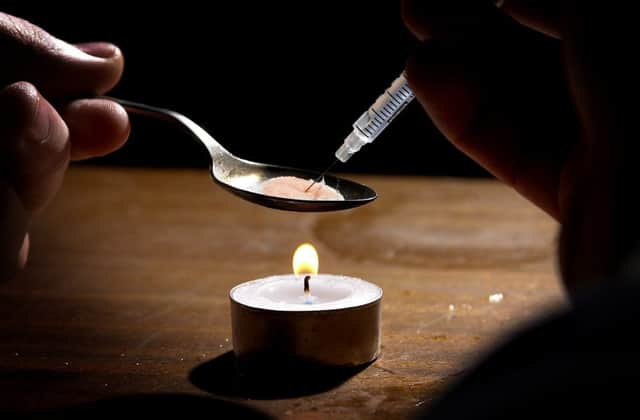Problem drug users in Scotland '˜increasingly aged over 35'


Official figures published last week reveal there is an estimated 30,000 problem drug users over the age of 35 - the so-called “Trainspotting generation” which began taking drugs in the 1980s or early 1990s.
In Scotland, the latest available estimates show that the proportion of all male problem drug users, aged 35 to 64, increased from 43 per cent in 2009/10 to 51 per cent in 2012/13.
Advertisement
Hide AdAdvertisement
Hide AdOlder drug users are more likely to have prolonged history of drug use, and exhibit health problems generally associated with people in the general population who are 15 years older, a statistical bulletin prepared by the Scottish Parliament Information Centre (SPICe) noted.
The proportion of people aged 35 years and older being admitted to hospital for drug-related general acute stays was twelve times higher than in 1996, and 73 per cent (513) of drug related deaths registered in 2015 were for individuals in the same age group.
“There is a need to plan carefully for the future needs of this population to ensure that they are adequately cared for and that unplanned hospital admissions are kept to a minimum - currently they are significant and are likely to increase if we don’t improve our responses,” David Liddell, CEO of the Scottish Drugs Forum, told The Scotsman.
“In addiction treatment and related data, there is clear evidence of an ageing population of older people with a drug problem. Using 2012/13 data, it was estimated that of the 61,500 people with a drug problem, 31,500 were over the age of 35.
“This group tend to have had a drug problem for 15 years and more, and this population is set to increase significantly over the coming years.
“Research suggests that this group have the physical health equivalent to people 15 years older in the general population. Many of this group have multiple physical health problems alongside underlying mental health problems.”
The rise in ageing problem drug users comes at a time that drug use more generally is in decline.
The SPICe report noted all recent surveys of the general population in Scotland showed a reduction in the prevalence of drugs use among adults between 2008 and 2015.
Advertisement
Hide AdAdvertisement
Hide AdBut problem drug use north of the border remains disproportionately high compared to England and other European countries, and is primarily associated with the prolonged use of opioids and benzodiazepines, particularly among injecting users.
Opioids are associated with the most severe health problems and were implicated in 89 per cent of all drug-related deaths in 2015.
The authors of the report admitted “understanding the prevalence of illicit drugs use is difficult because much of the activity of the drug using population is hidden”.
Surveys of the general population can provide estimates of the prevalence of drug use, but “it is important to recognise that bias may be introduced by under-reporting or non-response” - meaning the number of ageing drug users may be far higher.
Liddell added: “The prevalence and trends data in relation to drugs and drug use always has challenges. In particular, this is around people who either under-report or over-report their drug use. This can be for a range of reasons and is particularly the case in face-to-face interviews, where people may feel judged. It’s therefore important to use a range of information sources to provide an overall picture of what is happening.”
Drugs legislation is currently reserved to the UK Parliament.